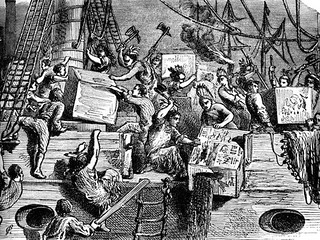
PREV ARTICLE
NEXT ARTICLE
FULL ISSUE
PREV FULL ISSUE
OVERSTAMPS AS FREE SPEECH
I shared this and the next article with Pablo Hoffman - we'd had a related conversation in January at the NYINC show about overstamps
on paper money (and the heated politics surrounding them). Here's his take on the overstamps. Thanks! -Editor
Although no camera phones were present, supposed eye-witness depictions of the event were soon disseminated. Samuel Adams and his cohorts executed the so-called “Boston Tea Party,” a revolutionary political demonstration. In the ripeness of time it has come to be considered an iconic event in the establishment of the common people’s right to protest. It is hallowed as emblematic of the American love of liberty and rejection of unprincipled authoritarian domination, and an essential assertion of patriotism culminating in the birth of the independent United States of America. Some two and a half centuries after the Boston Tea Party, we again see a number of rebellious political splinter groups and individuals declare themselves in revolt against the established law of the land and against the legally constituted government authorities. They destroy no property. Instead, some use the circulating money of the land as billboards on which to peacefully disseminate their demand that immensely affluent entities no longer be permitted to disproportionally influence the electoral process, an influence they consider to be undermining democracy. And Bernie Sanders heads one of those splinter groups. He calls for “a political revolution.” In every campaign speech he blasts the “Corporations Are People” decision by the Supreme Court in the 2010 Citizens United ruling enabling a “corrupt electoral process” wherein “billionaires buy elections.” (All quotes are his words.) This was his credo long before Ben Cohen’s overstamped dollar bills came along. The slogans placed on money by StampStampede.org and others are indeed, in my view, as much protected political speech as the ads on public TV airtime. Each federally issued paper money note is a unique copy of a bilateral written contract between the government and the bearer, and cannot be considered unencumbered property of the bearer. But the legality of the use of paper money as a tool of advocacy remains an open question, and may need to be definitively determined in court. The language of the relevant statute* prohibits defacing the currency, along with other assorted no-no’s, “with intent to render it unfit to be reissued.” The legislation erects an imposing hurdle for prosecutors, though; they can’t get a conviction without proof of “intent.” Overstamping the notes can only mean that the maker has the explicit intent of reissuing (defined as continuing to use) the notes. The most reasonable interpretation may be that the overriding pivotal consideration governing any alteration of current paper money is simply that, with intent, total incapacitation of the notes qua money or, of course, any attempt to deceive, is impermissible. Charles Green, the Secret Service agent in Kansas City, who is quoted in the article as saying, “We see it as a violation of the law,” may find that is not the last word on the subject. * 18 U.S.C. § 333 : US Code - Section 333: Mutilation of national bank obligations Whoever mutilates, cuts, defaces, disfigures, or perforates, or unites or cements together, or does any other thing to any bank bill, draft, note, or other evidence of debt issued by any national banking association, or Federal Reserve bank, or the Federal Reserve System, with intent to render such bank bill, draft, note, or other evidence of debt unfit to be reissued, shall be fined under this title or imprisoned not more than six months, or both. (June 25, 1948, ch. 645, 62 Stat. 700; Pub. L. 103–322, title XXXIII, § 330016(1)(B), Sept. 13, 1994, 108 Stat. 2146.) Wayne Homren, Editor The Numismatic Bibliomania Society is a non-profit organization promoting numismatic literature. See our web site at coinbooks.org. To submit items for publication in The E-Sylum, write to the Editor at this address: whomren@gmail.com To subscribe go to: https://my.binhost.com/lists/listinfo/esylum All Rights Reserved. NBS Home Page Contact the NBS webmaster 
|
